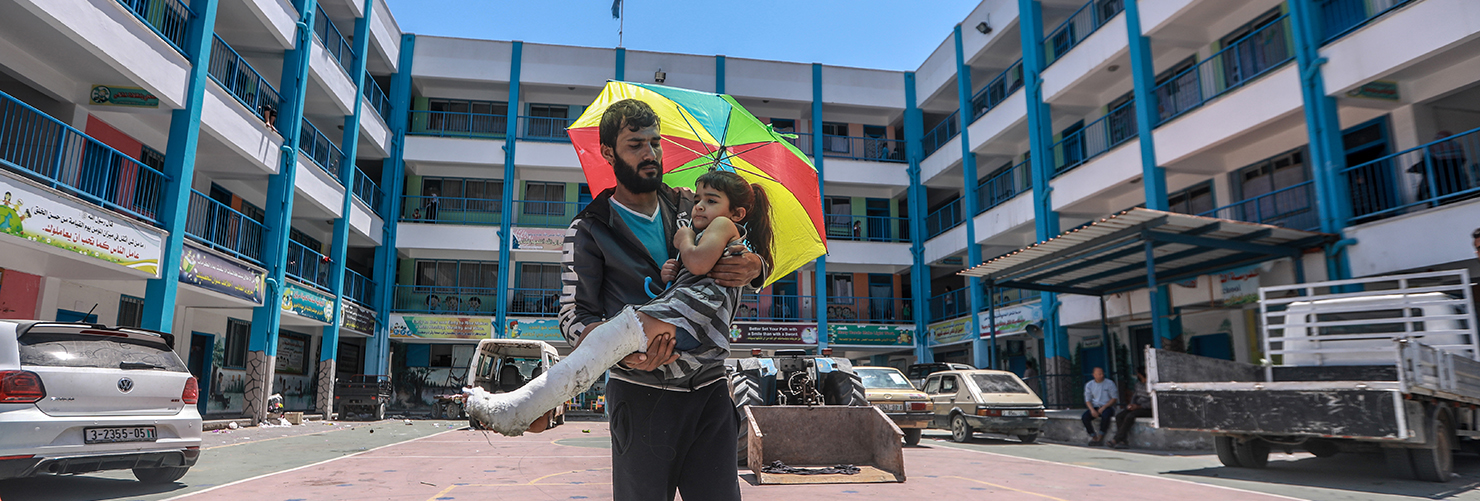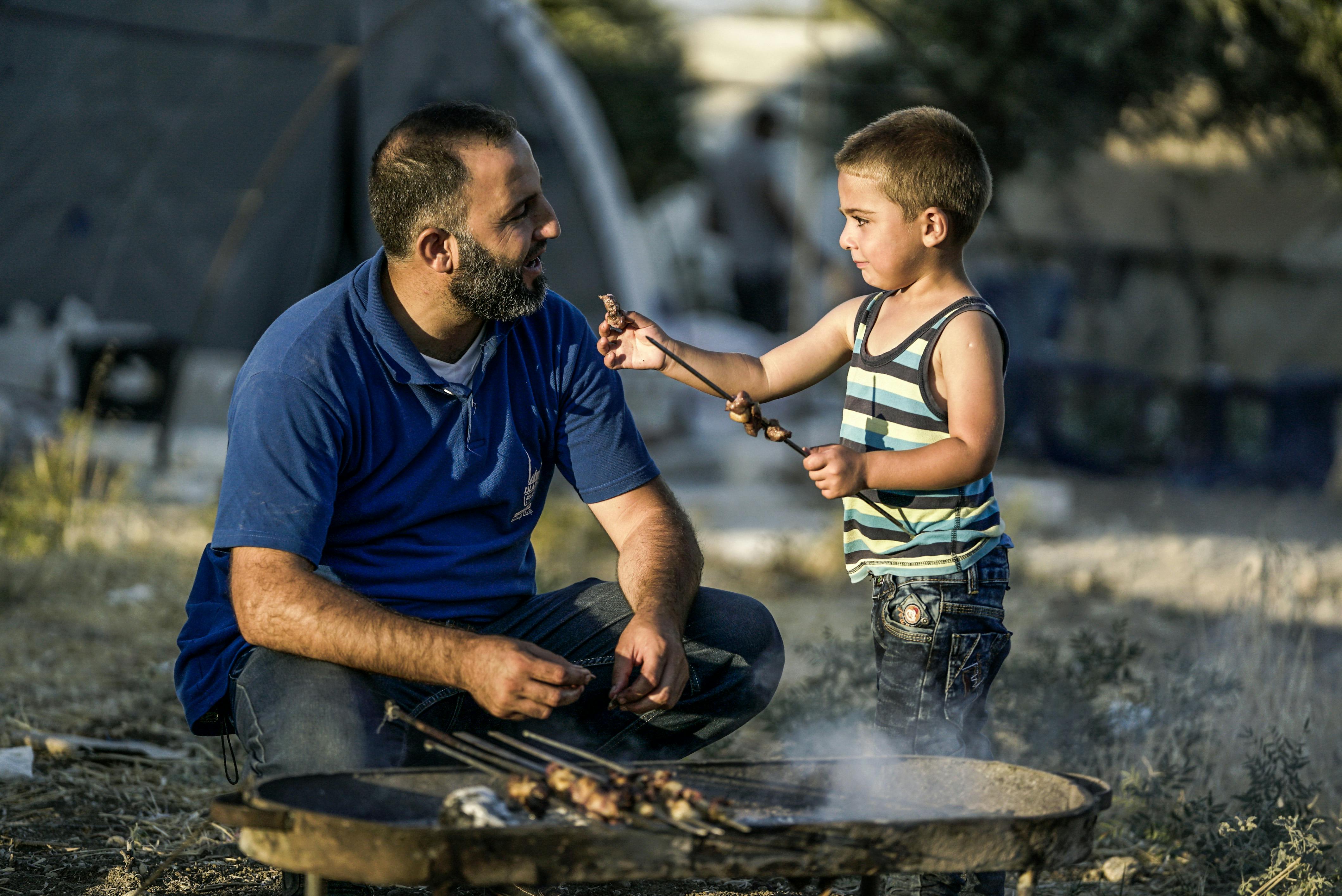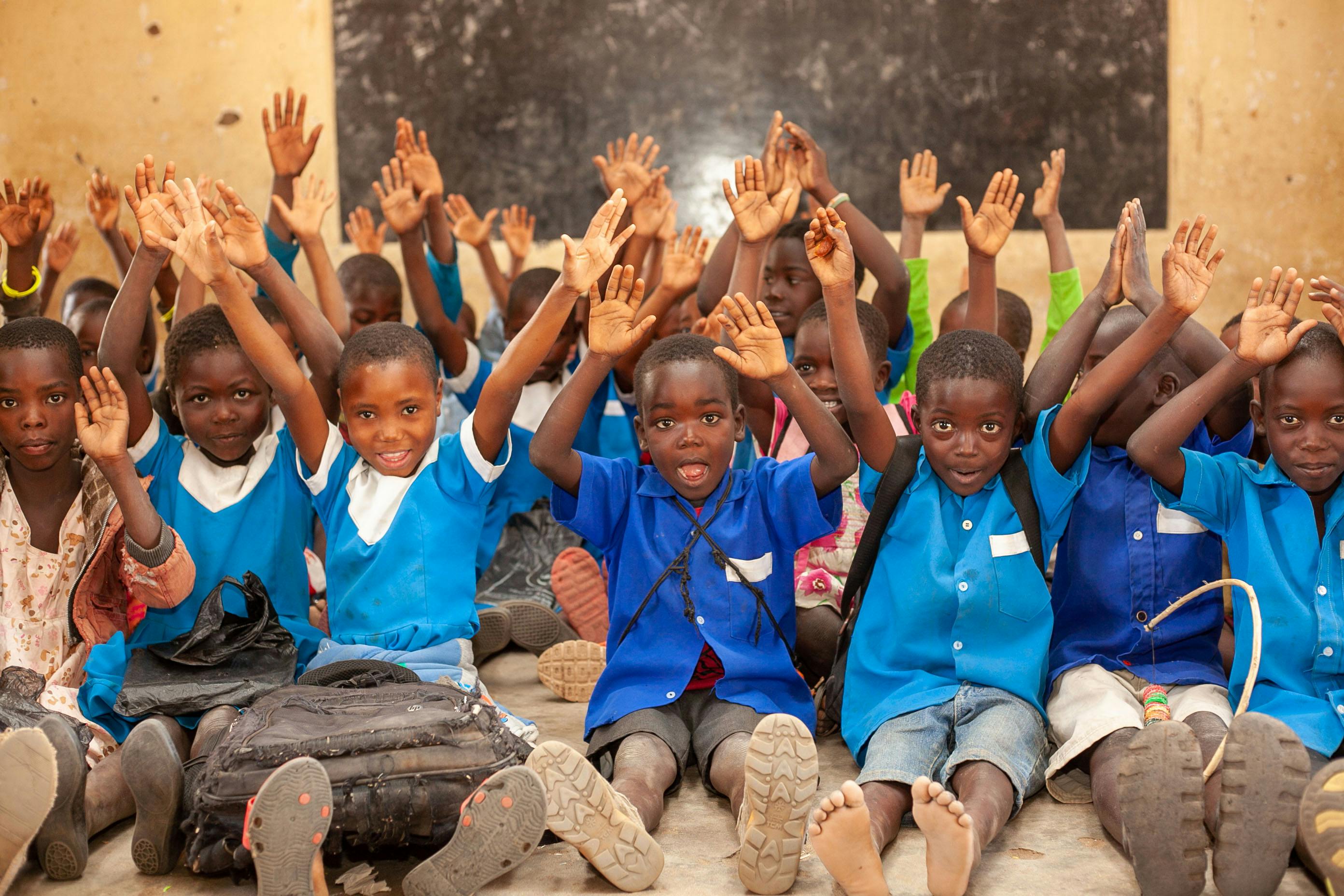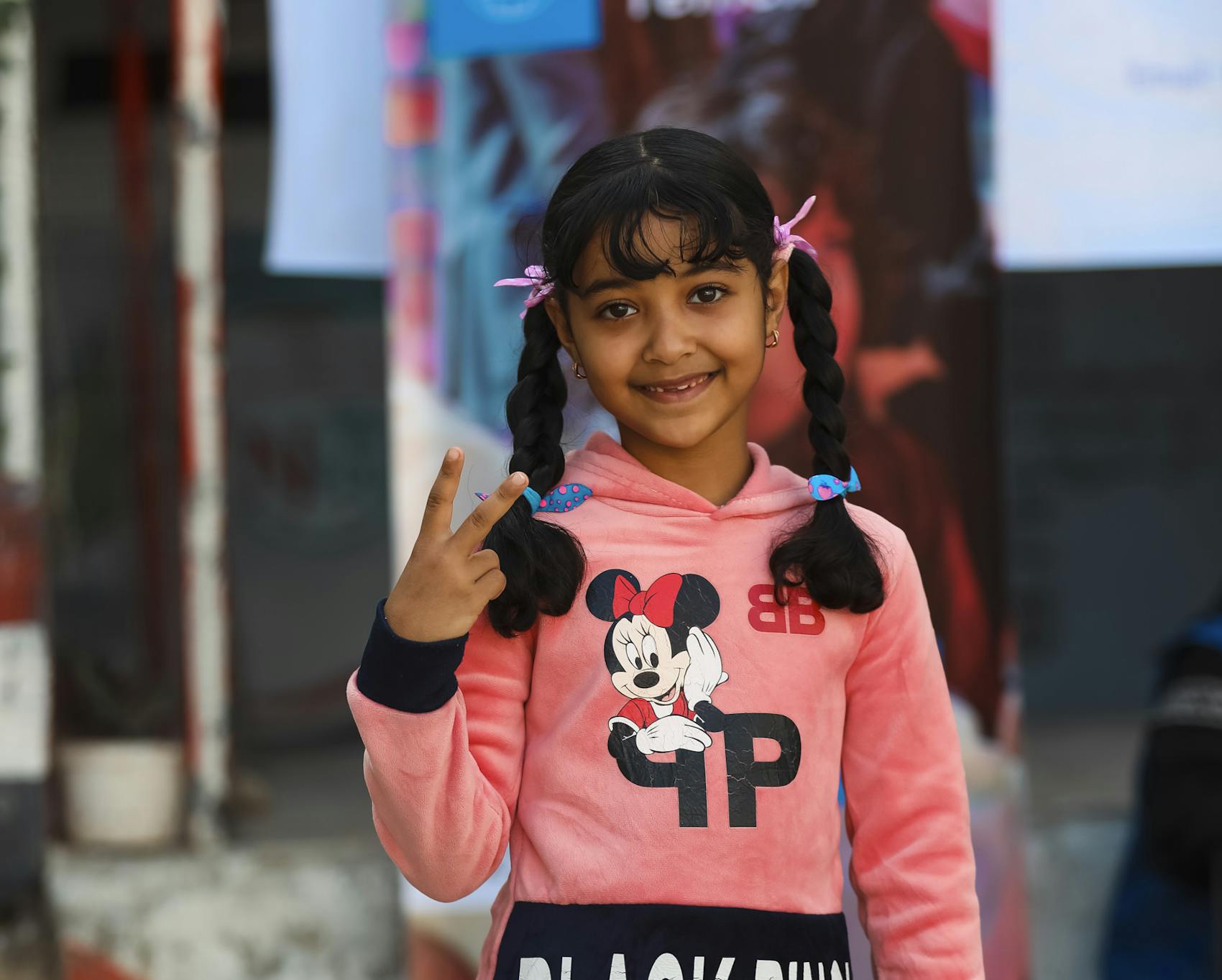

In Charity Week, the choice of what projects will be funded is in the hands of all of you who raise funds for Orphans and Children in Need. Have a read below and click the link to give your preference as to what should be funded this year.

Emergencies
As well as providing emergency support, Islamic Relief is committed to helping those in need recover and rebuild after disaster strikes.
As emergencies occur, the support involves an evolving process of assessing the situation and need, whilst helping in the most effective way possible.
Islamic Relief understands the importance of supporting such emergency projects, so we aim to include emergency aid projects alongside projects that aim to be sustainable and have a longer lasting impact.
However with an emergency situation we cannot guarantee that all beneficiaries will be children, but will benefit families and the most affected communities.
Palestine Emergency Relief
Nearly a year of crisis in Palestine has led to widespread displacement, and as per United Nations approximately 85% of the Gaza Strip's population left vulnerable and lacking access to essential resources like food, water, and medicine.
Last year through Charity week we were able to provide emegency relief to Palestine and this year we pledge a further $1million+ to support the ongoing relief.
This project aims to address these urgent needs by:
- Providing hot meals and clean water
- Offering psychosocial support and recreational activities for children
- Establishing Water, Sanitation & Hygiene facilities
The aim is to meet the basic needs of the Palestinian people and sustain their well-being until the situation improves.
Sudan Emergency Response
Sudan is confronting the world's most severe hunger crisis, with starvation quickly spreading throughout the country. The humanitarian response is critically underfunded, while access to some of the hardest-hit areas remains blocked by both bureaucratic delays and ongoing violence from the conflicting parties.
Vulnerable women, girls, and children, who are often the first to suffer in such crises, face heightened risks of disease due to inadequate sanitation facilities.
- This project aims to address the critical needs of vulnerable populations by improving hygiene and sanitation to reduce disease risks.
- Additionally, it will enhance access to safe water for 1,660 households in North Kordofan, providing essential relief to around 10,000 displaced individuals. The installation of two boreholes will ensure access to potable water, offering both immediate support and long-term resilience for those affected by the crisis.
Bangladesh Flood Appeal
Around 3 million people have been affected by flooding due to heavy monsoon rains in the southeastern districts of Bangladesh. Many are stranded and in need of evacuation to shelters. Islamic Relief teams are on the ground, present and responding.
- This project focuses on delivering emergency relief and providing lifesaving assistance.

Education
58 million children of primary school age do not attend school, with the majority of them coming from marginalised groups.
Quality learning requires a safe, friendly environment, qualified and motivated teachers. A lack of trained teachers, inadequate learning materials, makeshift classes and poor sanitation facilities make learning difficult for many children. Others come to school too hungry, sick or exhausted from work or household tasks to benefit from their lessons.
The consequences: There are an estimated 617 million children and adolescents around the world are unable to reach minimum proficiency levels in reading and mathematics, even though two thirds of them are in school.
Improving Education in the Kilifi and Tana River Counties
The Kilifi and Tana River counties of Kenya are characterised by high poverty, with poor access to education being a significant challenge.
The overall literacy rate is 34% with many school-age children remaining at home.
This project addresses the education gap by enhancing access through an improved learning environment.
- This involves contributing to the improvement of infrastructure and education equipment of two primary schools, including classrooms, sanitation blocks and a library.
- It also includes the renovation of four primary schools.
Upgrading School Libraries for a Lasting Impact in Malaysia
The education of students is crucial in shaping a knowledgeable generation. This project is dedicated to enhancing the educational environment for vulnerable students in two rural schools in Sarawak: SK Nanga Kesit and SK Nanga Menyebat (Malaysia). These schools face significant challenges due to inadequate facilities, limited financial resources, and a lack of essential learning equipment.
- The goal is to create a conducive learning environment by refurbishing existing structures, providing necessary digital tools like Smart TVs and electronic tablets, and constructing new libraries.
- This initiative will directly benefit 145 students, with an indirect impact on 1,000 individuals, including family members and the local community.
Through this project, we aim to empower these students, many from low-income and marginalized communities, by equipping them with the resources needed to excel academically and personally. Our commitment to sustainable development and quality education ensures that these efforts contribute to a brighter future for the students and their communities.
Zero Out of School Children in Rwanda
Rwanda, with its high population density and significant youth demographic, has made notable progress in primary education, achieving near-universal enrollment. However, gaps remain for out-of-school children and dropouts. To address these issues, multiple charities and partners are uniting together, to launch a comprehensive initiative to ensure that no child misses out on primary education.
The wider project aims to enroll 177,119 out-of-school children, including 17,712 with disabilities, and assist 15,240 additional individuals over five years.
Charity Week is supporting this larger initiative along with other partners.
- The approach includes making education more accessible by removing financial barriers and enhancing teacher skills, while improving school environments and community engagement.
- The project will focus on marginalised groups such as children from low-income families, those affected by gender norms, children with disabilities, and refugees.
Upgrading Sanitation for Osizweni Community Care Centre in South Africa
The Osizweni community project is a holistic project aimed at empowering communities, by providing support to mothers and guardians on core issues that are prevalent in the local community. They offer primary education to 429 learners. Currently, the hygiene facilities at the Centre are deteriorating and insufficient for the growing population.
- This project aims to contribute to the construction of new toilet facilities for all 429 learners and 41 staff members, in order to meet the required standards set by the Department of Education and to ensure there are adequate and hygienic facilities.
- This will be achieved by constructing 20 new toilets and one unisex disabled toilet.
Overcoming Educational Barriers for Students in Sri Lanka
In Sri Lanka, educational difficulties are compounded by disparities in access and resources, particularly in rural areas, leading to significant challenges in achieving equitable learning opportunities. High illiteracy rates persist among marginalised communities, exacerbated by economic hardships and limited educational infrastructure. This project is designed to enhance educational access and support for students affected by the ongoing economic crisis.
- The initiative will provide 800 bicycles to students facing transportation challenges, including 50 specialised bicycles for students with disabilities.
This project aims to create a more supportive and accessible learning environment for all.
Renewed Schools for Resilient Futures in Turkey
In 2023, Kahramanmaraş, a region in Southern Türkiye, experienced two consecutive major earthquakes, resulting in widespread damage to the region and affecting 16 million people. In particular, the destruction of schools disrupted the flow of education for 30,000 children.
- This project aims to respond to the educational needs of earthquake survivors by contributing to the construction of two new schools (one primary school and one preschool) in Kahramanmaraş.
- These two schools will contribute to ensuring access to education and creating safe learning environments for 954 students.

Empowering Communities
The community can be the heart of a locality, and investing in them directly, can lead to the upliftment of orphans and children in need that they support.
These projects look beyond the direct support of the children, and focus on providing the community better access to essential services, and the opportunity to improve their livelihoods and lift themselves out of poverty, permanently.
Improving Shelter for Families in Albania
Orphaned families in Albania are living in substandard housing conditions. Many homes are at risk of further damage due to factors such as poor insulation, inadequate roofing, damaged doors and windows, and possible earthquakes which are expected occurences in the active seismic zone of Albania. In particular, during winter months, families grapple with extreme cold due to uninsulated or damaged homes.
- This project aims to address this need by purchasing or constructing 13 shelter homes, benefiting 13 Orphan families, providing them will protection from harsh winter conditions and giving them functional living spaces.
Business Support and Skills Training in Iraq
Iraq has been grappling with serious long-term challenges including conflict, displacement, economic instability, and social upheaval. One particular challenge is faced by orphan families, who struggle with economic instability due to the loss of their breadwinners, limited employment opportunities and disrupted livelihoods due to these ongoing challenges. This economic insecurity means their ability to meet basic needs such as food, shelter, and healthcare is significantly reduced.
- This project aims to address these challenges by providing support to orphan families to initiate new businesses, such as tailoring, agriculture and handcraft production.
- It will also support orphan families in scaling up their existing businesses.
- Finally, this project will also deliver foundational business management sessions tailored for orphan guardians.
Through these measures, the project aims to see an increase in monthly household income of participating families, and ultimately to improve support provided to caregivers of orphan families.
Supporting Women and Children of Underprivileged Communities in the Philippines
The Mindanao conflicts in the Philippines have left devastating effects on some of its regions. In some of the poorest regions, at least 60% of the population live below the poverty threshold.
In 2020, Charity Week funded a project that supported the educational needs of 200 children in the region.
- This year, we will be extending that support to continue improving access to education for the affected children, as well as supporting 250 female entrepreneurs to develop a sustainable livelihood in order to provide for their families.
Food, Water and Livelihood Support for Drought-Effected Communities in Somaliland
Communities in the Sool, Sanaag, and Togdheer regions of Somaliland are struggling under the weight of drought, conflict, and climate change. In villages like Oog and Erigavo, displaced families have been forced to abandon their livestock and farms, leaving them without the means to survive. In Ceelxume, crop failures and reduced agricultural output have left farmers desperate.
This project aims to provide urgent relief and rebuild livelihoods by:
- Supporting 200 farming households with drought-tolerant seeds, tractor hours, and essential agricultural inputs.
- Livestock will be restocked, and treatment campaigns will be conducted to ensure animal health.
- Training will also be provided to equip these communities with the skills needed to overcome these challenges and secure their future.
Shelter, Protection and Education for Syrian Refugees
After years of violence and crisis in Syria, the worst earthquake in a century struck, compounding the ongoing tragedy. The survivors now face extensive damage to homes, buildings, and water systems.
This project aims to support Syrian refugees and Jordanian host communities by addressing their shelter, protection, and education needs. It will focus on vulnerable groups, including women-headed households, survivors of sexual and gender-based violence, people with disabilities, the elderly, and unaccompanied children.
Key activities include:
- Conducting awareness sessions on gender-based violence and child protection for 3,000 refugees and host community members.
- Offering group resilience-building activities and psychosocial support to 1,000 conflict-affected individuals.
- Providing remedial classes, education kits, and cash allowances to students through a mobile education bus.
The project is designed to alleviate the suffering of those affected by the Syria crisis and improve their overall well-being.
Empowering Children
Children are the most vulnerable, and can be affected greatly by circumstances which are out of their control.
Alongside the other projects for CW2025, these projects support orphans directly or the most vulnerable children in our communities needing the highest level of care.

Paediatric Cancer Care Support in the UK
Children can be born with or aflicted by rare and serious conditions, which often are life changing for both the child and their family. This requires the specialist expertise of paediatricians alongside specialist equipment too.
- This project aims to support the implementation of a new children's cancer centre in one of the world's leading cancer hospitals.
Orphan Sponsorship: Pakistan, Palestine and South Africa
Children can find themselves in unfortunate circumstances where the primary breadwinner suddenly passes away, leaving them and any relatives in need, in the midst of their education and livelihood.
- This project aims to continue the ongoing support of orphans to provide either through regular sponsorship payments or funds to continue and complete their education and cover any needed livelihood costs.
